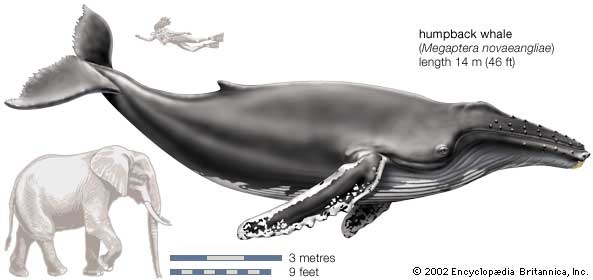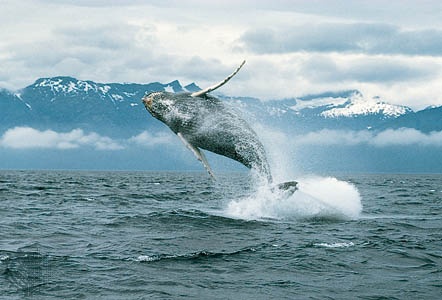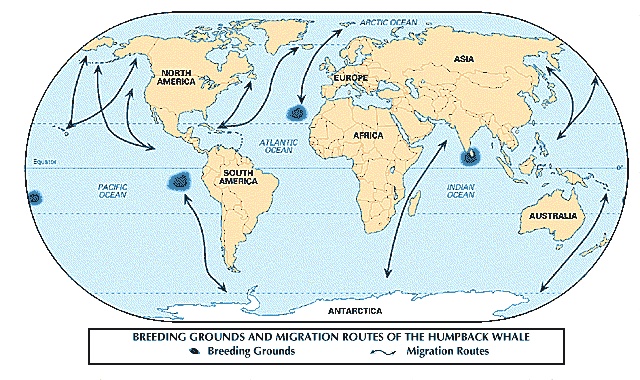humpback whale
mammal
 a baleen whale known for its elaborate courtship songs and displays. Humpbacks usually range from 12 to 16 metres (39 to 52 feet) in length and weigh approximately 36 metric tons (40 short 【U.S.】 tons). The body is black on the upper surface, with a variable amount of white below, and it has about 30 broad ventral grooves on the throat and chest. This cetacean is distinguished from other baleen whales by its long, narrow flippers, which are about a third as long as the body and scalloped on the forward edge. Humpbacks also have large knobs on the head, jaws, and body, each knob being associated with one or two hairs. The dorsal fin is small and set far back on the body.
a baleen whale known for its elaborate courtship songs and displays. Humpbacks usually range from 12 to 16 metres (39 to 52 feet) in length and weigh approximately 36 metric tons (40 short 【U.S.】 tons). The body is black on the upper surface, with a variable amount of white below, and it has about 30 broad ventral grooves on the throat and chest. This cetacean is distinguished from other baleen whales by its long, narrow flippers, which are about a third as long as the body and scalloped on the forward edge. Humpbacks also have large knobs on the head, jaws, and body, each knob being associated with one or two hairs. The dorsal fin is small and set far back on the body.
 Humpback whales live along the coasts of all oceans, occasionally swimming close to shore, even into harbours and rivers. They undertake long migrations between polar feeding grounds in summer and tropical or subtropical breeding grounds in winter. Diet consists of shrimplike crustaceans called krill, small fish, and plankton, which the humpback whale strains out of the water with its baleen. Humpbacks use a unique method of feeding called bubblenetting, in which bubbles are exhaled as the whale swims in a spiral below a patch of water dense with food. The curtain of bubbles confines the prey to a small area in the middle of which one or more whales surface.
Humpback whales live along the coasts of all oceans, occasionally swimming close to shore, even into harbours and rivers. They undertake long migrations between polar feeding grounds in summer and tropical or subtropical breeding grounds in winter. Diet consists of shrimplike crustaceans called krill, small fish, and plankton, which the humpback whale strains out of the water with its baleen. Humpbacks use a unique method of feeding called bubblenetting, in which bubbles are exhaled as the whale swims in a spiral below a patch of water dense with food. The curtain of bubbles confines the prey to a small area in the middle of which one or more whales surface.The most vocal (vocalization) of all whales, humpbacks make a great variety of sounds, from moans and cries to groans and snores. The whales string these together to form “songs” lasting 5–35 minutes. The songs vary among groups of whales in different regions and undergo gradual but distinctive changes from year to year.
The humpback is also one of the most acrobatic cetaceans. It frequently breaches by leaping belly-up completely clear of the water, then arching backward and returning to the surface with a loud slapping sound. When beginning a deep dive, the animal hunches its back and rolls steeply forward, bringing its tail out of the water and perpendicular to the ocean surface.
The humpback whale was at one time commercially valuable and was greatly reduced in numbers by overhunting in the early and mid-20th century. It has been protected worldwide from commercial whaling since the mid-1960s, and many populations have increased. These population increases have prompted the International Union for Conservation of Nature (IUCN) to change the status of the humpback whale from endangered to vulnerable.
Although the humpback is the only species in the genus Megaptera, it is related to other rorquals (rorqual) of the family Balaenopteridae, including the blue whale, fin whale, and sei whale. The latter portion of the humpback's species name is a Latin reference to the New England colonies, where it was first scientifically described.
- concept
- concept formation
- Conception Bay
- conceptismo
- conceptual art
- concertato style
- concertina
- concertino
- concerto
- Concert of Europe
- concerto grosso
- conch
- Concha Alós
- concheros
- Conchidium
- Conchita Cintrón
- Conchos River
- conciliarism
- Concini, Concino, Marquis d'Ancre
- Concino Concini, Marquis d'Ancre
- Concino, Marquis d'Ancre Concini
- Concise Encyclopaedia Britannica
- Concise Encyclopædia Britannica
- conclave
- Concord